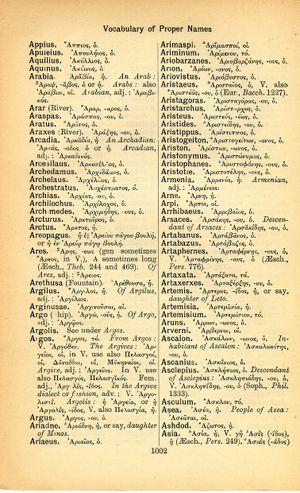Arcadia
English > Greek (Woodhouse)
Ἀρκαδία, ἡ
An Archadian: Ἀρκάς, -άδος, ὁ or ἡ.
Arcadian, adj.: Ἀρκαδικός.
Latin > English (Lewis & Short)
Arcădĭa: ae, f.,
I a town in Crete, Sen. Q. N. 3, 11, 4; Plin. 31, 4, 30, § 53.
Arcădĭa: ae, f., = Ἀρκαδία,
I a mountainous province in the centre of the Peloponnesus, the Greek Switzerland, Plin. 4, 6, 10, § 20; Verg. E. 4, 58; Ov. M. 2, 405; 9, 192 al.—Hence, derivv.
A Arcădĭcus, a, um, adj., = Ἀρκαδικός, Arcadian: asinus, Plaut. As. 2, 2, 67; Varr. R. R. 2, 1, 14; cf. Plin. 8, 43, 68, § 167; Pers. 3, 9.—Arcadicus juvenis for a simpleton (since the Arcadians, as mostly mountaineers, were considered as a simple, uncultivated people), Juv. 7, 160.—
B Arcădĭus, a, um, adj., = Ἀρκάδιος, Arcadian: Arcadius sus, the Arcadian boar, * Lucr. 5, 25: dea, i. e. Carmenta, who came from Arcadia to Italy, Ov. F. 1, 462: virgo, i. e. the nymph Arethusa, id. Am. 3, 6, 30: deus, i. e. Pan, Prop. 1, 18, 20: rupes, id. 1, 1, 14: agri, id. 3, 24, 23: sidus, i. e. the Great Bear, Sen. Oedip. 476: virga, the wand of Mercury (who was born upon the Arcadian mountain Cyllene, and worshipped there), Stat. Th. 2, 70: galerus, the helmet of Mercury, id. ib. 7, 39.

